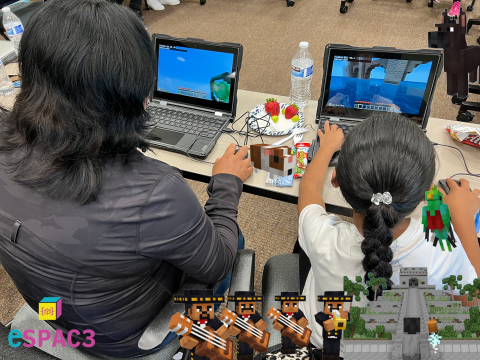Body
Image

Project eSPAC3: Celebrating Latinidad to Develop Spatial Computational Thinking Skills
Project eSPAC3 (pronounced "eh-space") is a four-year National Science Foundation initiative aimed at developing upper-elementary students' spatial computational thinking skills and awareness of computationally-intensive careers, with a focus on celebrating Latinidad. It utilizes Minecraft: Education Edition to create an immersive, culturally affirming learning experience. Through family engagement, near-peer mentorship, and expert modeling via career videos featuring Latin@ professionals, it fosters a collaborative learning community that reinforces aspirational capital and elicits funds of knowledge. Project eSPAC3 prioritizes equity in STEM education by providing culturally relevant content and resources, ensuring students have exposure to culturally relevant rich experiences and opportunities to succeed.
Pillar 1: Innovative Use of Technologies in Learning and Teaching
Project eSPAC3 innovatively utilizes Minecraft: Education Edition to foster spatial computational thinking and awareness of computationally-intensive careers among upper-elementary students, with a focus on celebrating Latinidad. Through culturally relevant experiences, family engagement, near-peer mentorship, and expert modeling via career videos, it creates an immersive, collaborative, and empowering learning environment.
Pillar 2: Partnerships for Career and Workforce Preparation.
Project eSPAC3 partners with Latin@ professionals to create career videos, showcasing real-world applications of spatial computational thinking. Additionally, eSPAC3 works with San Diego Workforce Partnership to provide resources and connections with professionals, enhancing workforce preparation.
Pillar 3: Strategies for Equity in STEM Education
Project eSPAC3 promotes equity in STEAM education through culturally relevant content, family engagement workshops, and near-peer mentorship. It emphasizes Latinidad, celebrates cultural wealth, and incorporates students' funds of knowledge.

Discipline(s)
Computer and informational technology science
Engineering
Interdisciplinary
Mathematical sciences
Target Gradespan(s)
Elementary school (K-5)
Target Participant(s)
Youth / students
Educators
Parents / caregivers / families
Hispanic/Latino participants
English learners
Students eligible for free lunch or reduced-price lunch
Project Setting(s)
Formal Education
Informal Education
Category
Research Study
Youth-Based